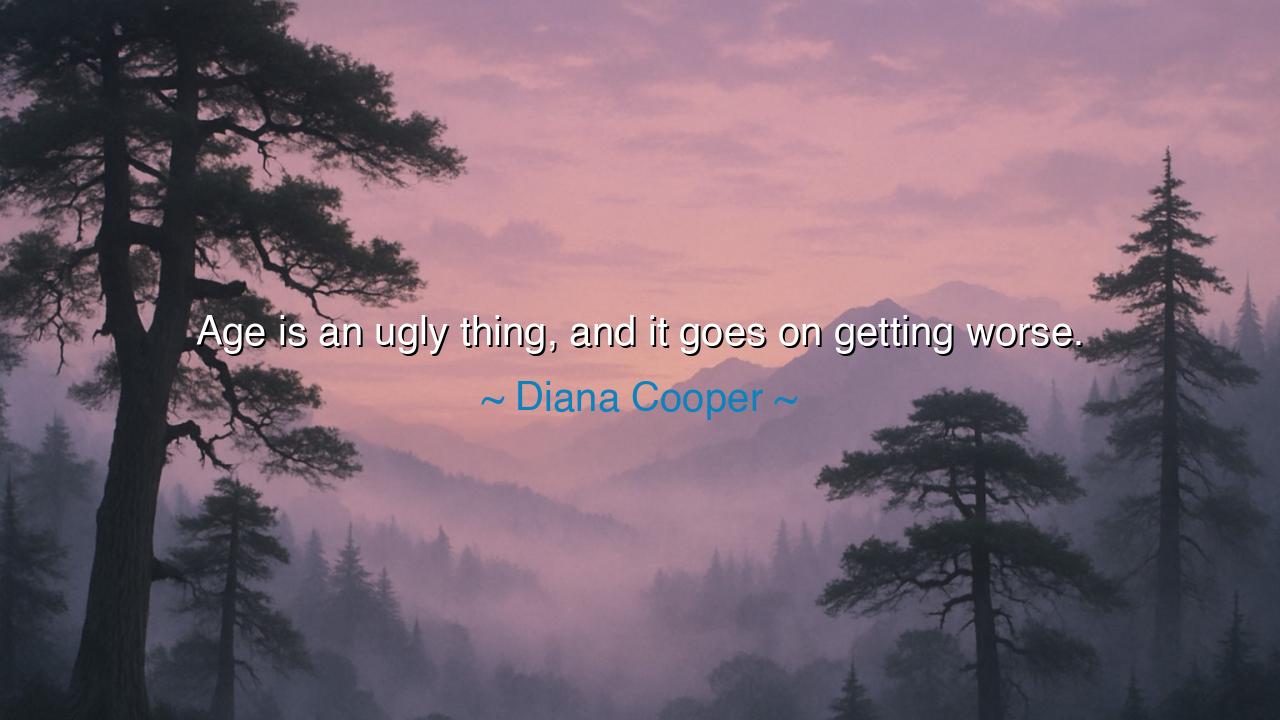
Age is an ugly thing, and it goes on getting worse.






When Diana Cooper, the British actress and icon of elegance, once said, “Age is an ugly thing, and it goes on getting worse,” her words were not meant as cruelty or despair, but as a confession — honest, unadorned, and steeped in the melancholy of truth. Beneath the sharpness of her statement lies the sorrow of a woman who had lived long enough to see beauty fade, friends pass, and time’s slow, relentless hand etch its mark upon the face and spirit. Her words do not mock life; they mourn its transience. For in her age, Diana Cooper was not lamenting vanity, but the deeper grief of impermanence — that youth, strength, and light slip away, and that even the noblest heart must one day bow before the passage of years.
To understand her words, we must know the world from which they were spoken. Diana Cooper, born into the glittering society of early twentieth-century England, was the muse of poets, painters, and princes. She possessed the rare beauty that defined eras — radiant, ethereal, almost untouchable. Yet, as she aged, she watched that image, once worshipped, begin to crumble in the eyes of others. The world that had adored her youth grew indifferent to her years. Thus her statement — “Age is an ugly thing” — is not the bitterness of vanity, but the cry of one who had learned that the world too often mistakes fading appearance for fading worth. She had seen how swiftly society turns its gaze from the old, as if time itself were a kind of exile.
And yet, within her lament lies a universal mirror. For all who live long enough must confront the slow erosion of what once seemed eternal — the beauty of the body, the sharpness of the mind, the vigor of desire. The ancients knew this truth and did not shy away from it. The Greek poet Sappho wrote of beauty’s impermanence; the Roman philosopher Cicero pondered the indignities of old age even as he praised its wisdom. And yet, time has never been gentle — it strips away illusion and leaves us face to face with the core of who we are. Cooper’s words sting because they are honest: age brings decay, and the decay deepens. But beneath the ugliness she names lies a hidden invitation — to seek a kind of beauty that time cannot touch.
Consider the life of Leonardo da Vinci, who, in his later years, no longer possessed the vigor of youth, yet his vision grew more profound. His sketches of old men and women, their faces lined and weary, are filled with a tenderness that young hands could never have drawn. He had come to see in those creases the story of a life lived deeply. Likewise, the Japanese philosophy of wabi-sabi teaches that beauty is found not in perfection, but in impermanence — in the cracked vase, the faded leaf, the aged hand. Thus, if we read Diana Cooper’s words through this lens, we find not despair but recognition: the outer form withers, but the inner light can still glow fiercely, even in shadow.
Still, her honesty must not be softened. To age is to lose much — not only beauty, but certainty, independence, and often the place one once held in the hearts of others. It is a kind of dying that begins long before death. Yet it is precisely because of this loss that age demands courage. It calls upon the soul to detach from the vanity of form and to root itself instead in meaning, memory, and love. For though the face may fade, the spirit can grow luminous; though the body weakens, the heart can strengthen in compassion. The ugliness Cooper names belongs to the surface; the beauty that can still be found belongs to the depths.
So, O seeker of wisdom, do not shrink from these words. They are not a curse but a challenge. Accept that time will take from you the gifts it once gave, but let it leave you something greater — the grace to endure and the humility to see anew. Nurture your mind, your kindness, your sense of wonder, for these are the forms of beauty that age refines, not destroys. Be gentle with your reflection; it is the record of your becoming. As the years advance, live not in resistance but in reverence for what remains — the friendships that deepen, the memories that enrich, the love that endures even when all else falters.
Thus, the teaching endures: age is indeed cruel to the body, but it can be kind to the soul. The one who mourns what is lost must also learn to honor what is gained — patience, insight, and the quiet strength that only time can teach. Diana Cooper’s words remind us of the truth we all must face, but also of the power we hold in how we face it. Though age may “go on getting worse,” the heart, if it remains awake and loving, can grow ever more beautiful — not in the eyes of the world, but in the eyes of eternity.






AAdministratorAdministrator
Welcome, honored guests. Please leave a comment, we will respond soon